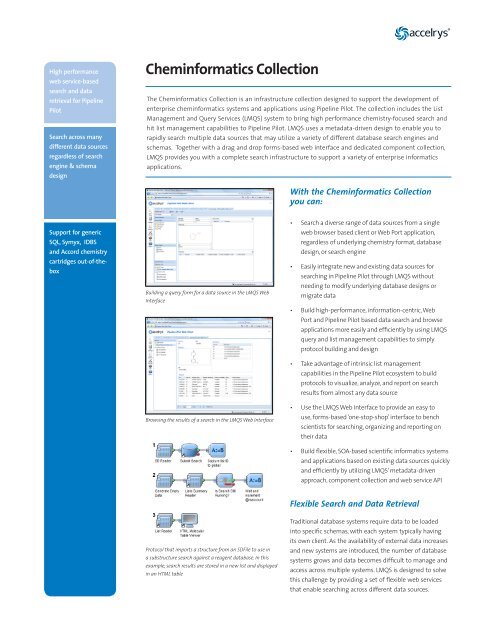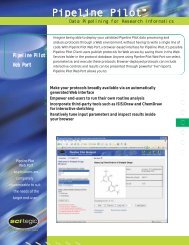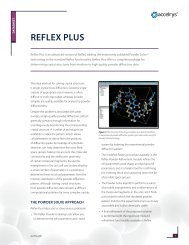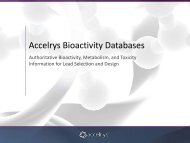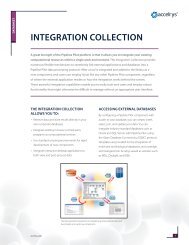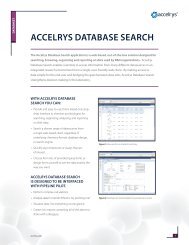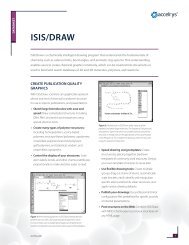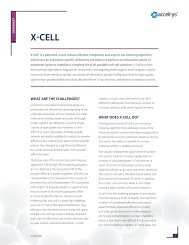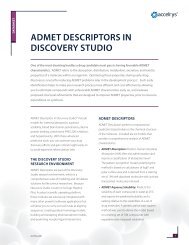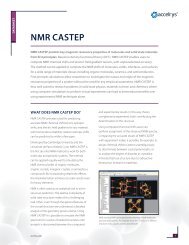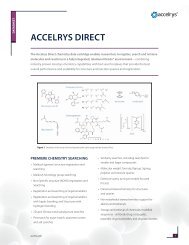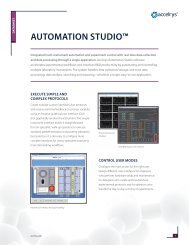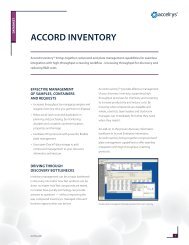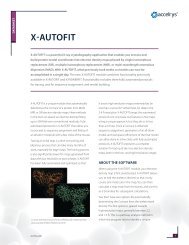Datasheet: Cheminformatics Collection - Accelrys
Datasheet: Cheminformatics Collection - Accelrys
Datasheet: Cheminformatics Collection - Accelrys
You also want an ePaper? Increase the reach of your titles
YUMPU automatically turns print PDFs into web optimized ePapers that Google loves.
High performance<br />
web service-based<br />
search and data<br />
retrieval for Pipeline<br />
Pilot<br />
Search across many<br />
different data sources<br />
regardless of search<br />
engine & schema<br />
design<br />
Support for generic<br />
SQL, Symyx, IDBS<br />
and Accord chemistry<br />
cartridges out-of-thebox<br />
<strong>Cheminformatics</strong> <strong>Collection</strong><br />
The <strong>Cheminformatics</strong> <strong>Collection</strong> is an infrastructure collection designed to support the development of<br />
enterprise cheminformatics systems and applications using Pipeline Pilot. The collection includes the List<br />
Management and Query Services (LMQS) system to bring high performance chemistry-focused search and<br />
hit list management capabilities to Pipeline Pilot. LMQS uses a metadata-driven design to enable you to<br />
rapidly search multiple data sources that may utilize a variety of different database search engines and<br />
schemas. Together with a drag and drop forms-based web interface and dedicated component collection,<br />
LMQS provides you with a complete search infrastructure to support a variety of enterprise informatics<br />
applications.<br />
Building a query form for a data source in the LMQS Web<br />
Interface<br />
Browsing the results of a search in the LMQS Web Interface<br />
Protocol that imports a structure from an SDFile to use in<br />
a substructure search against a reagent database. In this<br />
example, search results are stored in a new list and displayed<br />
in an HTML table<br />
With the <strong>Cheminformatics</strong> <strong>Collection</strong><br />
you can:<br />
•<br />
•<br />
•<br />
•<br />
•<br />
•<br />
Search a diverse range of data sources from a single<br />
web browser based client or Web Port application,<br />
regardless of underlying chemistry format, database<br />
design, or search engine<br />
Easily integrate new and existing data sources for<br />
searching in Pipeline Pilot through LMQS without<br />
needing to modify underlying database designs or<br />
migrate data<br />
Build high-performance, information-centric, Web<br />
Port and Pipeline Pilot based data search and browse<br />
applications more easily and efficiently by using LMQS<br />
query and list management capabilities to simply<br />
protocol building and design<br />
Take advantage of intrinsic list management<br />
capabilities in the Pipeline Pilot ecosystem to build<br />
protocols to visualize, analyze, and report on search<br />
results from almost any data source<br />
Use the LMQS Web Interface to provide an easy to<br />
use, forms-based ‘one-stop-shop’ interface to bench<br />
scientists for searching, organizing and reporting on<br />
their data<br />
Build flexible, SOA-based scientific informatics systems<br />
and applications based on existing data sources quickly<br />
and efficiently by utilizing LMQS’ metadata-driven<br />
approach, component collection and web service API<br />
Flexible Search and Data Retrieval<br />
Traditional database systems require data to be loaded<br />
into specific schemas, with each system typically having<br />
its own client. As the availability of external data increases<br />
and new systems are introduced, the number of database<br />
systems grows and data becomes difficult to manage and<br />
access across multiple systems. LMQS is designed to solve<br />
this challenge by providing a set of flexible web services<br />
that enable searching across different data sources.
© 2009 <strong>Accelrys</strong> Software Inc. All brands or product names may be trademarks of their respective holders.<br />
Metadata mapping of individual data sources to<br />
descriptive field names presented through LMQS<br />
web services enables users to query disparate data<br />
sources using a common set of query terms accessible<br />
through the LMQS Web Interface, Pipeline Pilot Web<br />
Port or by users building protocols with the Pipeline<br />
Pilot Professional Client.<br />
By using metadata, LMQS eliminates the need<br />
to migrate or modify database schemas to make<br />
individual data sources available to users for<br />
searching. It also provides the flexibility to modify<br />
data sources without recompiling code and makes<br />
it possible to replace database search engines. For<br />
example, LMQS makes it possible for you to switch<br />
from one chemistry cartridge to another without<br />
needing to make changes to business logic or clients.<br />
List Management<br />
One of the key capabilities that LMQS provides is the<br />
ability to organize search results into lists. When a<br />
user runs a search against a particular data source,<br />
for example against a corporate chemistry database,<br />
any resulting hits are organized and stored in a list,<br />
generated upon completion of the query. Lists may be<br />
browsed, sorted, edited and deleted by users through<br />
the LMQS Web Interface. Lists can also be consumed<br />
and processed directly within Pipeline Pilot, making it<br />
possible for you to store a list of molecules generated<br />
from a user search for reference and process it<br />
through protocols for additional analysis, reporting, or<br />
for export to other applications.<br />
LMQS Web Interface<br />
An integral part of the LMQS system is the LMQS<br />
Web Interface, a thin, AJAX-based client interface that<br />
provides drag and drop forms building for querying<br />
and data browsing from within a standard web<br />
browser. Easy to use and deploy with zero footprint,<br />
the LMQS Web Interface enables users to design<br />
forms that can be associated with individual data<br />
sources to enable them to run searches and browse<br />
results lists. The Interface also provides a List Manager<br />
view that enables users to manage and browse any<br />
of their results lists and generate reports, calculate<br />
descriptors or export to other applications by calling<br />
<strong>Cheminformatics</strong> <strong>Collection</strong><br />
Pipeline Pilot protocols directly. Views of lists can be<br />
shared with other users by generating a link to a given<br />
list which can be copied into an email and sent to<br />
colleagues for viewing on their own desktop in a web<br />
browser or from within a portal environment.<br />
Component <strong>Collection</strong><br />
The LMQS Component <strong>Collection</strong> offers a number of<br />
components to maximize the utility of LMQS services<br />
within Pipeline Pilot and make data browse and<br />
search applications built from protocols faster, simpler<br />
to assemble and easier to maintain. The collection<br />
offers two reader components for returning individual<br />
list members or list status information into protocols<br />
along with a List Viewer component for displaying<br />
list contents in an LMQS Web Client list view grid. For<br />
searching data sources, a Submit Search component<br />
enables queries to be constructed and executed using<br />
LMQS services from within Pipeline Pilot protocols. Any<br />
lists generated by protocols are viewable from within<br />
the LMQS Web Interface.<br />
A Boon for SOA Development<br />
LMQS is built on open, industry standard<br />
technologies that include Simple Object Access<br />
Protocol (SOAP), Web Services Definition Language<br />
(WSDL) and XML Schema Definition Language<br />
(XSD). As well as being callable from within Pipeline<br />
Pilot protocols through a dedicated component<br />
collection, LMQS offers a full web service API for use<br />
within SOA system development. LMQS supports all<br />
Pipeline Pilot security and authentication methods<br />
including Active Directory and LDAP, making it<br />
possible for you to build highly secure but accessible<br />
search systems for the end user. By enabling system<br />
developers to support many different data sources<br />
or reconfigure underlying data sources and search<br />
engines without having to impact the end user,<br />
LMQS further augments the already powerful web<br />
service development environment that Pipeline Pilot<br />
provides.<br />
0309


